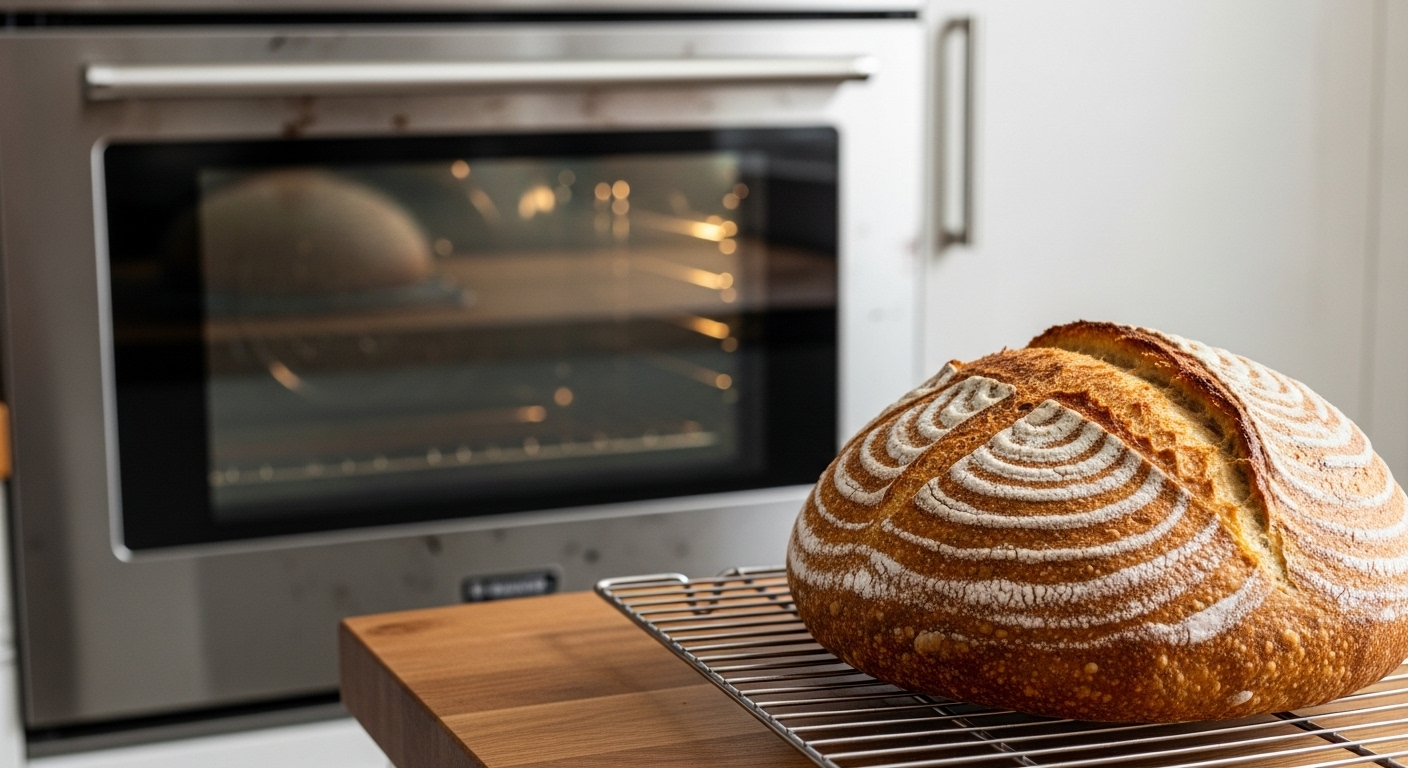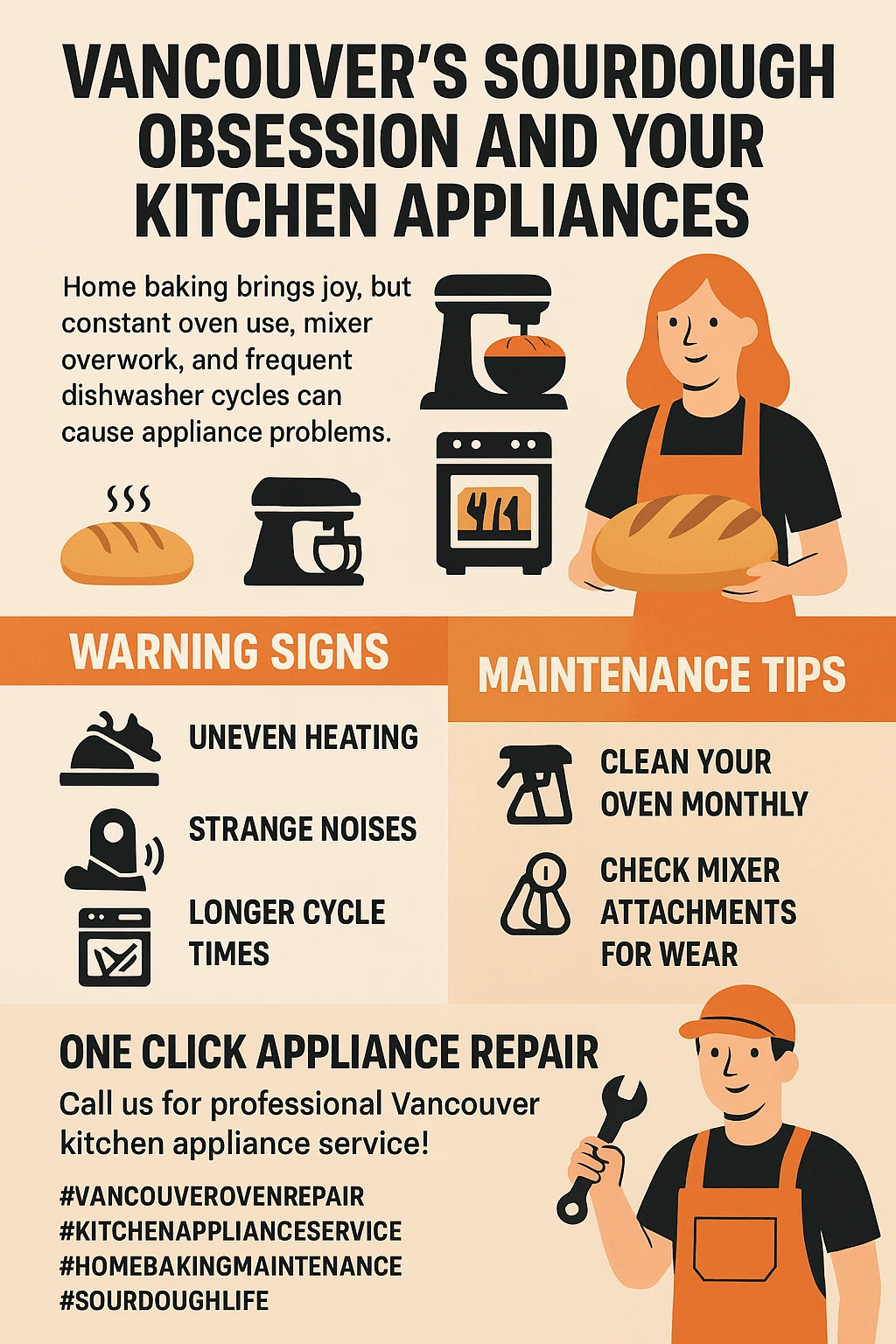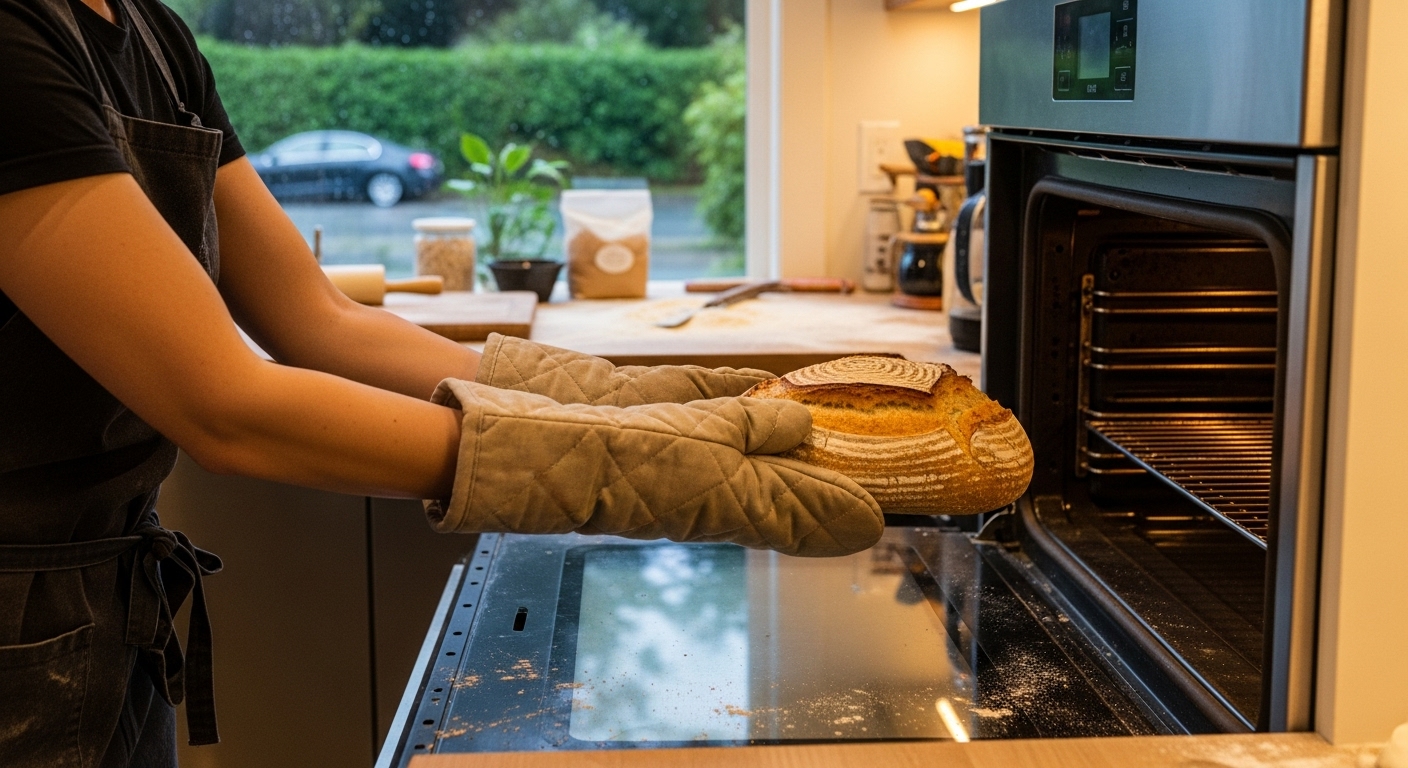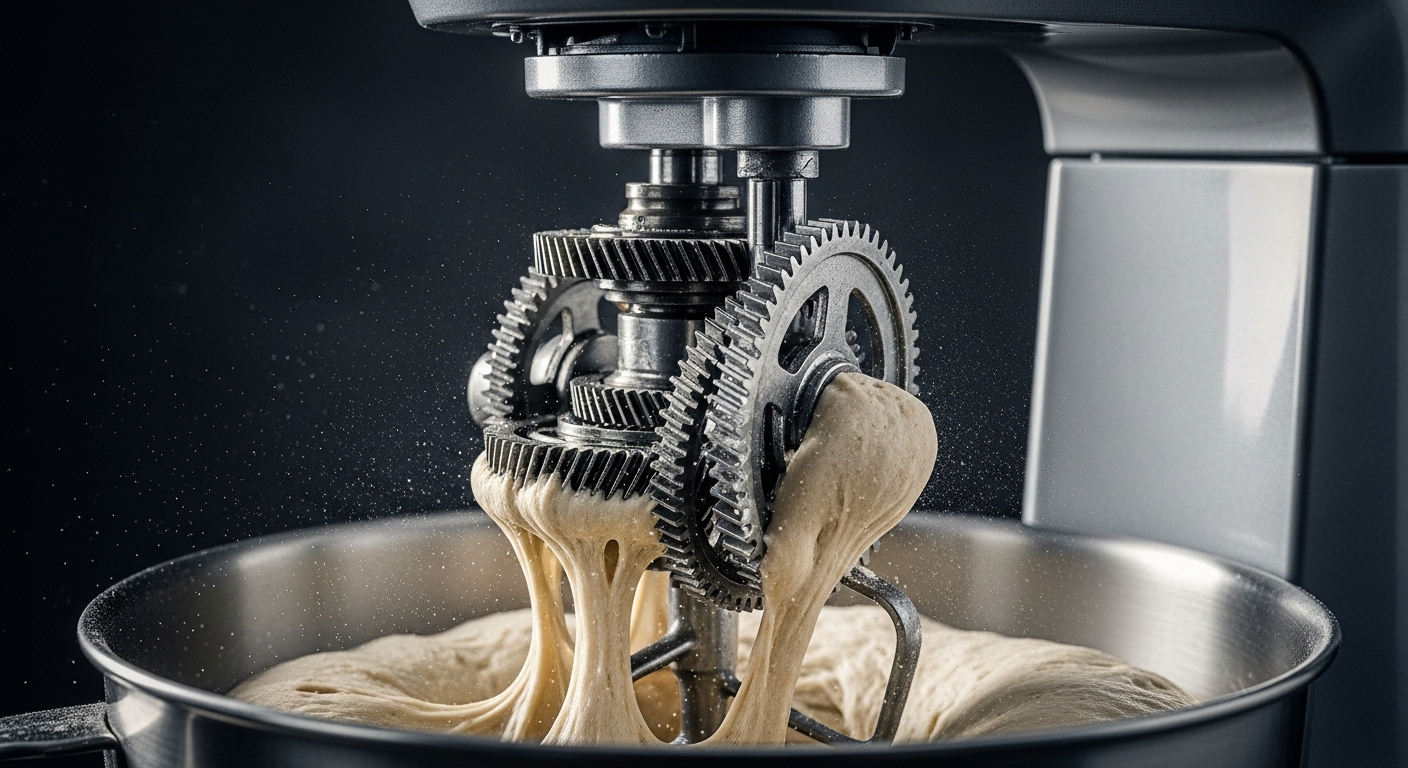Wondering how Vancouver’s sourdough obsession is secretly sabotaging your kitchen appliances? Discover the hidden maintenance costs that could save you hundreds in emergency repair bills before your oven burns out from overuse.
Vancouver’s artisan bread culture has exploded over the past few years, transforming home kitchens across the Lower Mainland into mini-bakeries producing crusty sourdough loaves around the clock. During the early pandemic weeks, yeast demand skyrocketed to six times typical levels while home baking frequency jumped 75% higher than normal, with new bakers accounting for 92% of yeast purchases. The city’s thriving sourdough scene, anchored by legendary spots like Terra Breads (30+ years strong) and A Bread Affair (BC’s first organic artisan bakery since 2005), has inspired countless Vancouverites to master the art of wild fermentation at home.

What most passionate home bakers don’t realize is that their newfound sourdough obsession is quietly accelerating wear on every appliance in their kitchen. From ovens running multiple cycles daily at high temperatures to stand mixers wrestling with thick, elastic dough, the hidden costs of frequent baking can shorten appliance lifespans by 30-50% without proper maintenance. With 67% of pandemic-era bakers planning to continue their elevated baking frequency permanently, understanding Vancouver appliance maintenance home baking practices has never been more critical for protecting your kitchen investment.
While the sourdough revolution has enriched Vancouver’s culinary landscape and filled homes with the intoxicating aroma of fresh bread, it’s also creating a maintenance crisis that most home bakers never see coming. The difference between a kitchen that supports years of passionate baking and one that breaks down from overuse lies entirely in understanding how frequent bread-making impacts your appliances and implementing the right preventive care strategies.
Key Outtakes:
- Frequent baking can reduce your oven’s lifespan from 15 years to 10 years or less without proper maintenance, with heating element replacements averaging $275
- The average appliance repair in Vancouver costs $220, but preventive maintenance can eliminate 75% of potential issues before they become expensive problems
- Stand mixers require annual re-greasing and can last 20+ years with proper care versus 5-7 years without, saving thousands in premature replacements
- Overloading dishwashers with baking equipment increases energy consumption and can cause motor strain leading to premature failure
- The 50% rule helps determine repair vs. replacement: if repair costs exceed 50% of a new appliance’s price and the unit has reached 50% of its expected lifespan, replace it

The Vancouver Sourdough Phenomenon: Understanding the Scale of Home Baking
Vancouver’s transformation into a sourdough capital didn’t happen overnight, but the pandemic certainly accelerated the trend beyond anyone’s expectations. The global sourdough market, valued at $3.30 billion in 2023, is projected to reach $5.32 billion by 2030 with a compound annual growth rate of 7.2%, according to industry research. This explosive growth reflects not just commercial bakery expansion but a fundamental shift toward home baking that has permanently altered how Vancouverites use their kitchens.

Local bakeries have been laying the groundwork for this artisan bread revolution for decades. A Bread Affair, established in 2005 as BC’s first organic artisan bakery, helped introduce Vancouverites to the complex flavors and textures possible with wild fermentation. Terra Breads, with over 30 years of history and multiple locations across the city, demonstrated that high-quality bread could become part of daily life rather than a special occasion luxury. These pioneers, along with newer spots like Batard Bakery in Fraserhood and Nelson the Seagull, created a culture where sourdough appreciation became deeply embedded in Vancouver’s food scene.
The pandemic transformed this appreciation into obsession practically overnight. Web traffic to yeast product websites increased by 600%, while searches for bread machine purchases jumped 400% in the early months of 2020. Yeast demand reached six times typical late-winter and early-spring levels, with some suppliers reporting complete sellouts that lasted for months. According to Taste Tomorrow’s 2025 bakery insights, sourdough remains the fastest-growing trend in the industry, with growing interest across English-speaking markets (+7%), Chinese-speaking communities (+14%), and French-speaking populations (+40%), perfectly reflecting Vancouver’s multicultural demographic.
What makes this surge particularly significant for Vancouver homeowners is its lasting impact on kitchen usage patterns. By late 2020, yeast product demand remained 50% to 80% above normal levels, and crucially, 67% of new home bakers indicated they would continue baking more frequently than pre-pandemic levels. For many Vancouver households, what started as a pandemic hobby has evolved into a permanent lifestyle change that fundamentally alters how kitchen appliances are used and maintained.
This shift from occasional weekend baking to multiple sessions per week represents a dramatic increase in appliance stress that most manufacturers never anticipated when designing home kitchen equipment. Ovens designed for typical family use (2-3 times weekly) are now running daily or even multiple times per day. Stand mixers engineered for periodic cake mixing are handling heavy bread dough several times weekly. The implications for appliance longevity and maintenance requirements are profound, yet most home bakers remain completely unaware of these hidden consequences until expensive repairs become unavoidable.
How Home Baking Accelerates Appliance Wear: The Hidden Costs
Understanding how frequent baking impacts your appliances requires looking beyond the obvious flour dust and considering the mechanical and thermal stresses involved in bread production. What appears to be harmless home baking actually subjects kitchen equipment to operating conditions far more demanding than typical cooking, creating wear patterns that can dramatically shorten appliance lifespans without proper attention.

The most significant impact falls on ovens, which bear the brunt of high-temperature, extended-duration cycles that sourdough baking demands. Electric ovens typically last 13-15 years with normal household use, while gas ovens average 15-17 years, but these estimates assume moderate usage patterns of a few times weekly. Frequent home bakers operating ovens 5-7 times weekly at the high temperatures required for proper bread crust development (450°F+) can reduce these lifespans to 10 years or less. The heating elements, door seals, and control systems simply weren’t designed for this level of continuous operation.
Compounding the wear issue is the common practice of using self-cleaning cycles to manage flour residue and spills from increased baking frequency. While convenient, these cycles operate at temperatures exceeding 550°F and place enormous stress on oven components. Manufacturers recommend limiting self-cleaning to twice yearly maximum, but heavy bakers often exceed this guideline significantly. From 1999 to 2003, kitchen ovens initiated 179,100 home fires resulting in 550 deaths and $1.2 billion in structural damage, with improper maintenance and overuse being contributing factors in many cases.
Stand mixers face their own unique challenges when transitioning from occasional cake batter mixing to regular bread dough handling. While quality mixers like KitchenAid can last 20+ years with proper maintenance, heavy dough places extraordinary stress on internal gears and requires more frequent lubrication than most owners realize. Approximately 75% of stand mixer issues can be attributed to inadequate maintenance, particularly the failure to re-grease internal components annually when handling dense bread doughs regularly. A worn-out gasket or O-ring between the mixer’s head and motor housing commonly develops leaks when stressed by thick sourdough, requiring seal replacement that costs $150-$250 but could be prevented with proper maintenance.
Even dishwashers, which might seem unaffected by baking frequency, experience accelerated wear from the increased loads of baking equipment. Mixing bowls, proofing baskets, bench scrapers, and measuring tools create additional cycles that can double normal dishwasher usage. Over 60% of dishwashers develop hazardous fungi growth due to inadequate filter cleaning, a problem exacerbated when flour and dough residues clog drainage systems more quickly than typical food particles. Overloading becomes common as bakers try to clean multiple sets of equipment efficiently, but this practice strains motors and suspension systems, potentially reducing the typical 7-12 year dishwasher lifespan by several years.
Range hoods face particular stress in Vancouver’s humid climate when subjected to extended baking sessions. According to NFPA 96 standards, moderate-volume kitchens should have their exhaust systems cleaned quarterly to prevent grease buildup, a fire hazard that intensifies with frequent high-temperature oven use.
Refrigerators also face increased strain, especially for bakers using cold fermentation techniques that require storing large dough containers for extended periods. This practice restricts airflow and forces compressors to work harder, increasing energy consumption and the risk of premature failure. A typical refrigerator is designed for a 20-year lifespan, but consistent overloading can shorten this to 12-15 years, leading to unexpected replacement costs that average $1,500 in Vancouver.

The 50% Rule: Deciding Between Repair and Replacement
When an appliance does fail, Vancouver’s home bakers face the critical decision of whether to repair or replace it. The “50% rule” provides a practical guideline: if a repair costs more than 50% of the price of a new appliance and the current unit is more than 50% through its expected lifespan, replacement is generally the more cost-effective option. For example, if a 10-year-old electric oven with a 15-year lifespan requires a $600 control board replacement and a new comparable oven costs $1,000, replacing it is the smarter financial move.
Understanding average repair costs in Vancouver is essential for making this calculation. A heating element replacement for an oven typically costs around $275, while a new control board can range from $400 to $700. Stand mixer repairs involving gear replacement can cost $200-$350. By comparing these figures against the age and replacement cost of your appliances, you can avoid sinking money into equipment that is nearing the end of its functional life.
Preventive Maintenance Checklist for Sourdough Enthusiasts
Proactive maintenance is the key to extending appliance lifespan and avoiding costly emergency repairs. Implementing a simple, regular checklist can mitigate over 75% of common baking-related appliance issues:
- Oven: Clean spills immediately to prevent baked-on residue. Check door seals for cracks or hardening quarterly and replace if they are no longer pliable to maintain temperature efficiency. Calibrate your oven temperature annually using an external thermometer.
- Stand Mixer: After each use, wipe down the exterior and clean attachments thoroughly. For heavy bread dough use (weekly or more), re-grease internal gears annually to prevent metal-on-metal wear. Listen for any unusual grinding noises, which may indicate gear strain.
- Dishwasher: Clean the filter weekly to remove food and dough particles. Run a cleaning cycle with a dishwasher-specific cleaner monthly to prevent fungal growth and mineral buildup. Avoid consistently overloading with heavy baking pans.
- Refrigerator: Clean condenser coils twice a year to ensure efficient heat exchange. Check door seals for a tight fit and keep the interior organized to promote proper airflow.
- Range Hood: Clean the grease filter monthly, as flour dust and steam from baking can create a sticky residue that reduces effectiveness and poses a fire risk.
Frequently Asked Questions (FAQs)
How often should I get my oven professionally serviced if I bake sourdough weekly?
For heavy home bakers, a professional service check every 18-24 months is recommended. This allows a technician to inspect heating elements, calibrate thermostats, and check electrical connections before they become major problems.
Is it normal for my stand mixer to get hot when kneading dough?
A stand mixer’s motor will naturally warm up during heavy tasks like kneading sourdough. However, if the housing becomes uncomfortably hot to the touch or you smell a burning odor, stop immediately and let it cool down. This indicates severe strain and may require professional inspection or re-greasing.
Can I use my oven’s self-cleaning feature more often if I bake a lot?
It’s strongly advised not to. The extreme heat of self-cleaning cycles is one of the leading causes of premature failure in electronic components like control boards. Stick to manual cleaning and limit self-cleaning to once or twice a year at most.
Why is my dishwasher not cleaning my baking tools properly?
This is often due to a clogged filter or spray arms. Flour and dough residue can create a paste-like substance that blocks water flow. Regular cleaning of these components is crucial for home bakers.
Wrapping Up: Protecting Your Kitchen Investment
Vancouver’s passion for sourdough is a testament to the city’s vibrant food culture, but it comes with a responsibility to care for the tools that make this craft possible. By understanding the unique stresses that frequent baking places on your kitchen appliances and committing to a proactive maintenance schedule, you can ensure your oven, mixer, and other essential equipment continue to support your passion for years to come. Don’t wait for a breakdown to become an expert in appliance care—start with small, consistent maintenance habits today to protect your investment and keep your kitchen running smoothly.


